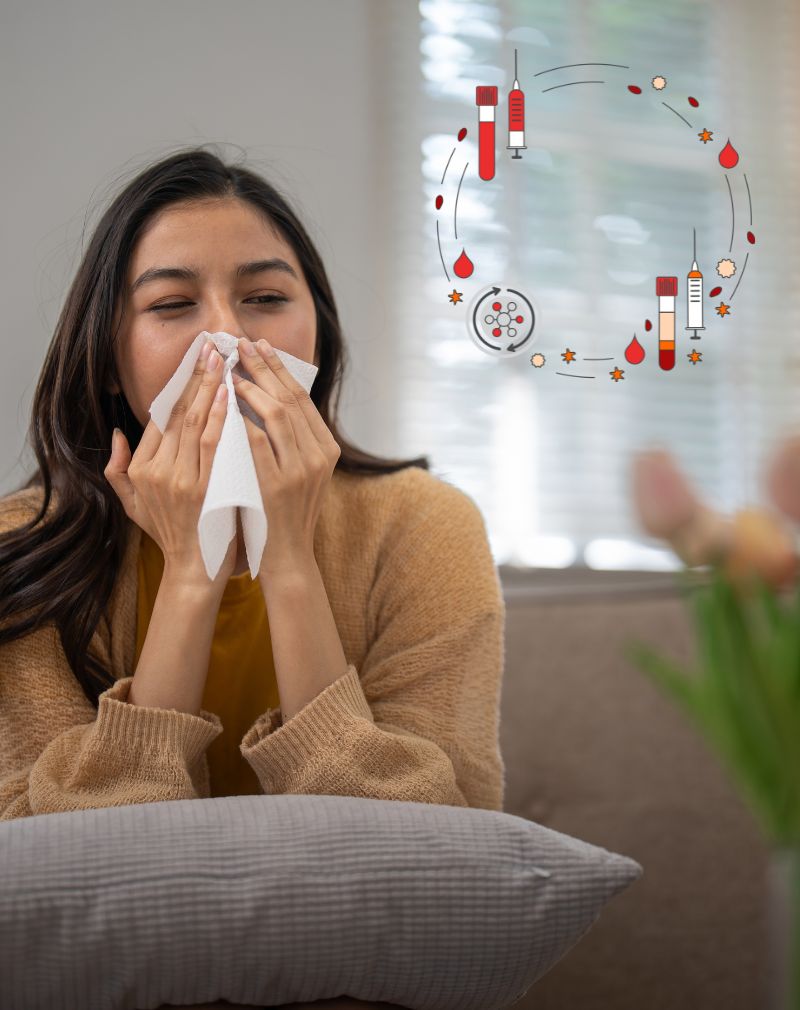Imagine this: a bright and bustling birthday party filled with laughter, colorful balloons, and the aroma of freshly baked treats. Amidst the excitement, a child cautiously inspects the snacks on the table, their parents hovering close by with an air of quiet vigilance. For this family, the celebration is laced with underlying tension; will the cookies contain hidden peanuts? Could cross-contamination from another dish trigger a reaction? What should be a carefree moment of joy becomes a careful balancing act, one that feels all too familiar to families navigating life with food allergies.
Now picture a young professional dining out at a trendy restaurant in Dubai. Despite carefully communicating their allergy to the server, they hesitate with each bite, their mind racing with “what ifs.” Even in environments designed for enjoyment, food allergies cast a long shadow, shaping daily decisions and interactions in profound ways. This is one of the primary complaints the doctors at our Allergy and Immunology Department receive.
The Growing Challenge of Food Allergies
Food allergies have become a global health concern, affecting individuals of all ages, from toddlers to adults. Recent data suggests that their prevalence has risen dramatically in recent decades. According to studies, approximately 10% of the global population is now affected, with children particularly at risk. This increase is compounded by the complex social and emotional challenges that allergies impose. From avoiding shared meals to worrying about unknown ingredients, the impact extends far beyond the physical symptoms, touching every aspect of life.
For those living with food allergies, everyday experiences like grocery shopping or attending social events require constant vigilance. The fear of accidental exposure and the potential for life-threatening reactions make food allergies not just a medical condition but a profound lifestyle challenge.
Support and Expertise at The American Wellness Center
Amidst these challenges, expertise and guidance can make all the difference. At The American Wellness Center in Dubai Healthcare City, we understand the unique difficulties posed by food allergies and are dedicated to empowering individuals and families with the tools and support they need to manage them effectively. From accurate diagnosis and comprehensive allergy testing to practical management strategies, our team provides compassionate care tailored to each person’s needs.
By partnering with trusted professionals, individuals with food allergies can regain control and focus on enjoying life’s moments, big and small, without fear. The journey to managing food allergies begins with understanding and that’s where we come in.
Understanding Food Allergies
Food allergies are more than just a nuisance; they represent a serious health concern for millions worldwide. Differentiating food allergies from intolerances is vital for proper management, and understanding their triggers and underlying mechanisms can empower individuals to take control of their health.
What Are Food Allergies?
A food allergy occurs when the immune system reacts abnormally to specific proteins in food. Unlike food intolerances, which involve digestive issues, food allergies can lead to severe, systemic reactions. For instance, lactose intolerance causes digestive discomfort, while a dairy allergy can trigger life-threatening symptoms.
Immune System Involvement
Food allergies typically involve Immunoglobulin E (IgE) antibodies. When a person eats an allergenic food, their immune system mistakenly identifies the protein as harmful, releasing chemicals like histamine that cause allergy symptoms.
Common Triggers
Understanding the foods most likely to cause allergic reactions helps in managing risk and avoiding exposure. Allergies often vary by region and cultural context, making it crucial to tailor awareness accordingly.
- Peanuts: Among the most common and severe allergens, peanuts often cause life-threatening reactions.
- Tree Nuts: Includes almonds, walnuts, hazelnuts, and cashews, which can lead to both mild and severe responses.
- Shellfish: Found in seafood dishes, shellfish allergies are prevalent in many Asian cuisines.
- Milk: A leading childhood allergen, though many outgrow it by adulthood.
- Eggs: Often found in baked goods and processed foods, making it tricky to avoid.
- Wheat: A common trigger that’s distinct from gluten intolerance or celiac disease.
- Soy: Frequently hidden in processed foods, soy allergies can be challenging to manage.
The Science Behind Allergies
The biological mechanisms behind allergies are intricate and often influenced by a combination of genetics and environmental factors.
- Genetic Factors: If one parent has an allergy, a child has about a 50% chance of developing one. This risk increases further if both parents are affected.
- Environmental Factors: Hypotheses such as the “hygiene hypothesis” suggest that reduced exposure to microbes in early childhood may lead to an increased risk of allergies. Additionally, urban living has been linked to a higher prevalence of food allergies compared to rural areas.
Recognizing the Signs
Identifying the symptoms of a food allergy can save lives. Reactions vary widely, from mild to severe, with some escalating to life-threatening emergencies like anaphylaxis.
Mild to Moderate Symptoms
- Hives: Itchy, red welts appearing on the skin.
- Swelling: Often localized around the lips, face, or eyes.
- Digestive Issues: Nausea, cramps, or diarrhea after eating the offending food.
Severe Reactions: Anaphylaxis
This potentially fatal reaction requires immediate attention. Symptoms include:
- Difficulty breathing due to throat swelling.
- A sudden drop in blood pressure.
- Loss of consciousness.
An epinephrine injection (e.g., EpiPen) is essential during an anaphylactic episode.
The Role of Early Diagnosis
Early recognition and diagnosis are critical, especially in children, to mitigate risks and implement effective management strategies. Comprehensive testing ensures accurate identification of allergens and helps create personalized action plans.
At The American Wellness Center in Dubai Healthcare City, our experts provide advanced diagnostic tools and compassionate care to help individuals and families live confidently, even with food allergies.
Managing Food Allergies
Effectively managing food allergies requires a proactive approach to daily living, preparation for emergencies, and exploring available treatment options. With the right strategies, individuals can reduce risks and live more freely.
Lifestyle Adaptations
- Reading Food Labels: Learning to interpret ingredient lists is essential to avoid allergens hidden in processed foods.
- Safe Dining Practices: Communicating allergies to restaurant staff, double-checking ingredients, and avoiding cross-contamination are vital habits.
Emergency Preparedness
- Carrying Epinephrine: Always having an epinephrine auto-injector is critical in managing severe allergic reactions like anaphylaxis.
- Allergy Action Plans: Collaborating with allergists to create a clear plan for managing reactions ensures both safety and peace of mind.
Treatment Options
- Role of Allergists: Expert testing and diagnosis help pinpoint allergens, forming the foundation of an effective management plan.
- Emerging Therapies: New approaches, such as oral immunotherapy, are providing hope by gradually desensitizing individuals to specific allergens.
The Psychological Impact
Food allergies extend beyond physical health, influencing social interactions and emotional well-being.
- Social Challenges: Children may feel excluded at school events, while adults often face stress during dining or travel.
- Anxiety Management: Fear of accidental exposure can lead to heightened anxiety, but professional guidance and education can reduce this burden.
How The American Wellness Center Supports Patients
At The American Wellness Center in Dubai Healthcare City, we prioritize empowering patients with comprehensive allergy care:
- Accurate Diagnosis: Advanced allergy testing ensures precise identification of allergens.
- Personalized Plans: Tailored management strategies, including nutritional guidance from expert dieticians.
- Proactive Care: Our allergists work closely with patients to develop action plans and explore treatment options like immunotherapy.
Take Control Today
Don’t let food allergies dictate your life. At The American Wellness Center in Dubai Healthcare City, we provide world-class expertise to help you manage your allergies with confidence. Reach out to us today for personalized care and step into a life of greater safety and freedom. Your well-being starts here.



